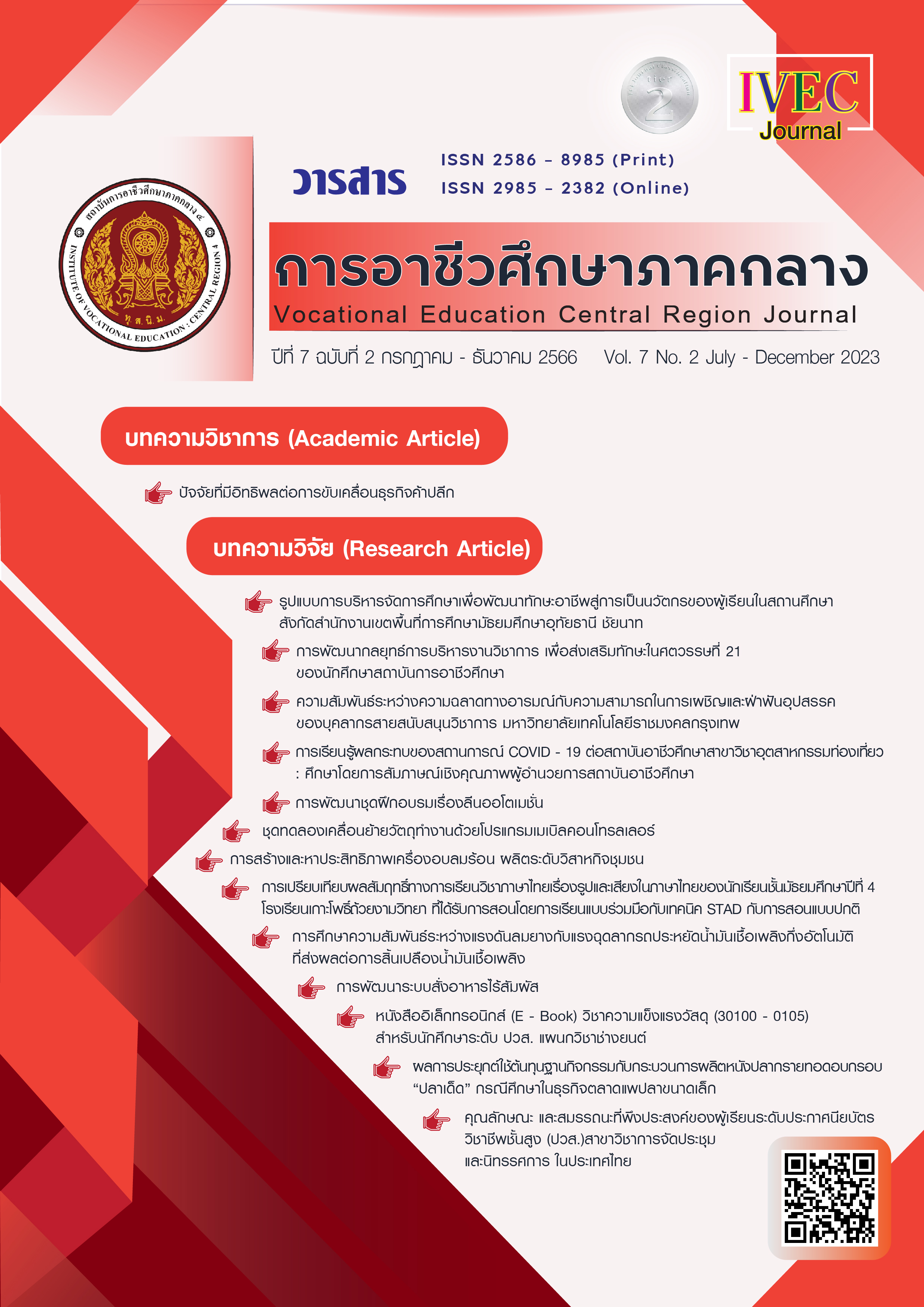Development of Academic Management Strategies to Promote Skills in the 21st Century of Vocational Institutions Students
Main Article Content
Abstract
This research aimed to: 1) develop the academic affairs administration strategies to promote students’ 21st century skills; and 2) certify academic affairs administration strategies to promote students’ 21st century skills in vocational institutions. This research was mixed - method research which was divided into 2 phases. In phase 1, development of academic affairs administration strategies to promote students’ 21st century skills, the key informants were 10 administrators of vocational institutions, directors of institutions under Vocational Education Institution, and experts in educational administration, derived from purposive selection. Data were collected by an interview form and analyzed by content analysis. The sample group responding to the questionnaire was 480 directors of educational institutions, deputy directors in academic affairs, heads of departments, and teachers, derived by stratified random sampling as distributed by region. Data were collected by a questionnaire and analyzed with frequency, percentage, mean, standard deviation, priority need index, as well as analysis of strengths, weaknesses, opportunities, and threats through 2S4M and PEST models and town matrix analysis. In phase 2, certification of academic affairs administration strategies to promote students’ 21st century skills, the informants were 12 administrators of vocational institutions, administrators of educational institutions, and experts in educational administration, derived from purposive selection. Data were collected by connoisseurship and analyzed by content analysis. The developed academic affairs administration strategies were implemented in one vocational institution, considered and selected according to the specified criteria, for three months. The informants were 9 administrators of educational institutions, teachers, heads of departments, school committees, and establishments. Data were collected by group discussion and analyzed by content analysis.
The results of this research were shown as follows:
- The academic affairs administration strategies to promote students’ 21st century skills consisted of 5 main strategies : 1) organizing a system for research and development of learning innovations to enhance students’ 21st century skills ; 2) upgrading the system development of media and technology in modern learning management through collaboration with establishments ; 3) adjusting the measurement and evaluation system to align with student performance ; 4) developing a bachelor’s degree curriculum in technology or operation that meets the needs of establishments in the 21st century ; and 5) organizing proactive learning management to develop students’ professional competency in the 21st century .
- Overall, the academic affairs administration strategies to promote students’ 21st century skills were accurate, appropriate, feasible, and practical at the highest level. The implementation of the developed academic affairs administration strategies revealed that Strategy 1 brought about a change in vocational institutions regarding teacher development , enabling them to have competency in managing learning in the digital age at the highest level ; Strategy 2 utilized technology media to manage learning according to subject areas ; Strategy 3 led to the measurement and evaluation of student learning based on professional competency ; Strategy 5 created cooperation between educational institutions and establishments in providing high - quality bilateral learning management ; and Strategy 4 upgraded the curriculum based on professional standards and international performance standards, respectively.
Article Details

This work is licensed under a Creative Commons Attribution-NonCommercial-NoDerivatives 4.0 International License.
|
บทความ ข้อมูล เนื้อหา รูปภาพ ฯลฯ ที่ได้รับการตีพิมพ์ในวารสาร การอาชีวศึกษาภาคกลาง ถือเป็นลิขสิทธิ์ของวารสารการอาชีวศึกษาภาคกลางหากบุคคลหรือหน่วยงานใดต้องการนำทั้งหมดหรือส่วนใดส่วนหนึ่ง ไปเผยแพร่ต่อหรือเพื่อกระทำการใด ๆ กองบรรณาธิการไม่สงวนสิทธิ์ ในการคัดลอกบทความเพื่อการศึกษาแต่ให้อ้างอิงแหล่งที่มาให้ครบถ้วน สมบูรณ์ สงวนสิทธิ์ โดย สถาบันการอาชีวศึกษาภาคกลาง 4 ที่ตั้ง 90 ถนนเทศา ตำบลพระปฐมเจดีย์ อำเภอเมือง จังหวัดนครปฐม โทรศัพท์ 034 242 856 , โทรสาร 034 242 858 ISSN : 3056-9176 (print) ISSN : 2985-2382 (online) |
References
จิตติรัตน์ แสงเลิศอุทัย. (2564 , กรกฎาคม – ธันวาคม). การพัฒนานวัตกรรมการจัดการเรียนรู้ : บทเรียนออนไลน์. วารสารวิจัยและพัฒนาหลักสูตร, 11, (2), หน้า 1 - 7.
นิรุตต์ บุตรแสนลี. (2565 , มกราคม - มิถุนายน). การเปลี่ยนผ่านสู่ความเป็นดิจิทัลของสำนักงาน คณะกรรมการการอาชีวศึกษา : การผลิตกำลังคนสมรรถนะสูงแห่งศตวรรษที่ 21. วารสารวิจัยและนวัตกรรมสถาบันการอาชีวศึกษากรุงเทพมหานคร, 5, (1), หน้า B-L.
สมพร ปานดำ. (2564 , มกราคม - มิถุนายน). การจัดการอาชีวศึกษาที่ตอบสนองกับการเปลี่ยนแปลงของโลกในอนาคต. วารสารวิชาการ CSNP JOURNAL สถาบันการอาชีวศึกษาภาคใต้ 1, 6, (1), หน้า 9 - 22.
สำนักงานคณะกรรมการการอาชีวศึกษา. (2562). หลักเกณฑ์และแนวปฏิบัติการจัดการอาชีวศึกษาระดับประกาศนียบัตรวิชาชีพ และระดับประกาศนียบัตรวิชาชีพชั้นสูง เรื่องที่ 7 การวัดและประเมินผลอาชีวศึกษา. กรุงเทพฯ : สำนักงานคณะกรรมการการอาชีวศึกษา.
สำนักงานคณะกรรมการการอาชีวศึกษา, สำนักมาตรฐานการอาชีวศึกษาและวิชาชีพ. (2562). กลยุทธ์การเสริมสร้างความเข้มแข็ง การจัดการเรียนรู้อาชีวศึกษาด้านธุรกิจและบริการด้วยเทคโนโลยีดิจิทัล. กรุงเทพฯ : สำนักงานคณะกรรมการการอาชีวศึกษา.
Ebel , R.L. , & Frisbie , D.A. (1986). Essential of Education Measurement. New jersey : Prentice - Hall.
Good , C.V. (1973). Dictionary of Education .(3rd ed.). New York : McGraw - Hill.
Wagner , T. (2008). The Global Achievement Gap. New York : Basic Books.


